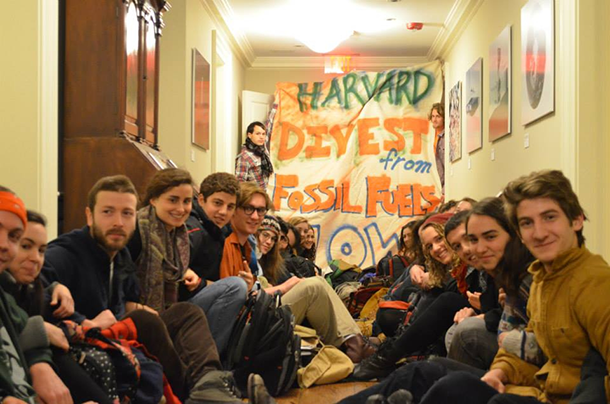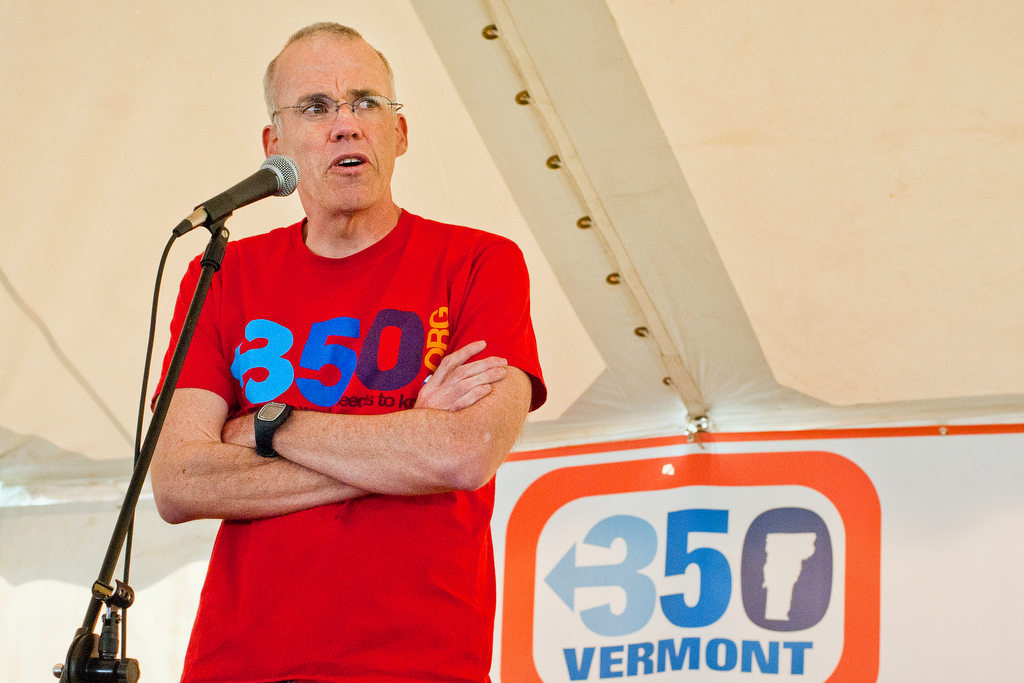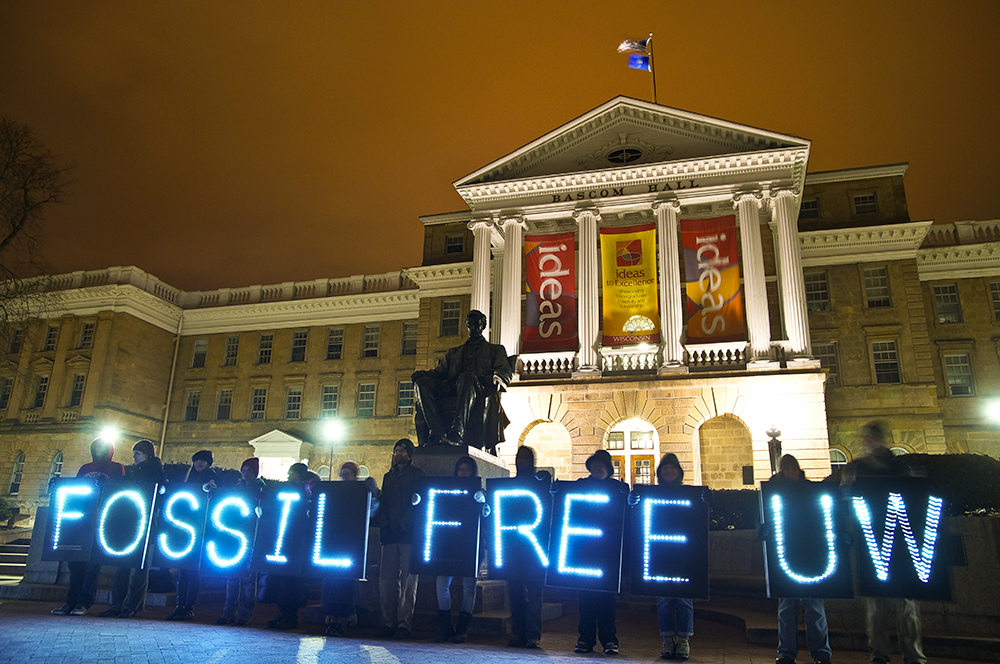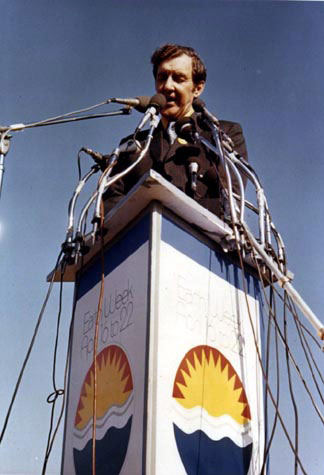Bill McKibben on Earth Day and the Power of Protest
Air Date: Week of April 10, 2015

Divest Harvard sit-in (Photo: 350.org; CC BY 2.0)
Earth Day is typically seen as an occasion to take action to help the environment, to ride your bike to work or pick up litter along rivers and streams. But environmental writer turned activist Bill McKibben tells host Steve Curwood we need to take to the streets together to solve the massive problem of climate change.
Transcript
CURWOOD: From the Jennifer and Ted Stanley Studios in Boston and PRI, this is Living on Earth. I’m Steve Curwood. Writer Bill McKibben is the award-winning author of the End of Nature and many more books, who’s now better known as the founder of the climate change advocacy group 350.org. As Bill has changed his focus from page to picket line, he’s gone to jail protesting the Keystone XL pipeline at the White House, and toured dozens of college campuses in the push to get endowments and pension funds to stop investing in fossil fuels. And as we approach the 45th Earth Day, Bill McKibben joins us to talk about the state of the environmental movement.
MCKIBBEN: Earth Day’s interesting because the most important one by far was the first one. I mean, I'm not sure any more is a very important moment in the year, but the very first one could not have been more important. In 1970, 20 million Americans went into the streets. That was about one American in ten of the then population, and that was absolutely enough to absolutely transform the political landscape. It may have been the highest participation in any protest in American history, and what it meant was, for the next 4 or 5 years, everything with the word environment in it got passed in Washington. Richard Nixon, who was as un-environmental a human being as it’s possible to imagine, he signed the Clean Water Act, the Clean Air Act, the National Environmental Policy Act, all because he knew that there was this tide of people who had been in the streets and were ready to go back, who were demanding action.
CURWOOD: So what happened to all that energy that did bring us the Clean Air and Water Act, Superfund and so forth? Where did it go?
MCKIBBEN: Well, I think a couple of things happened. One was the environmental groups, born many of them out of Earth Day, were winning everything in Washington. I remember the great Gus Speth, great environmentalist of the 20th century, telling me NRDC won every court case they fought for the first ten years after Earth Day. So what I think what they decided subconsciously was the way to do this is to be in Washington as experts. We've got all the juice we need; everyone's working with us. We'll just move this process along. And that's what happened for a while. The problem is, all that progress was not because they were right about things, though they were; it was because they had the power that came from a big movement behind them. It's like a battery with a lot of energy in it. Because everyone was in Washington lobbying instead of being out in the streets, revivifying that movement from time to time, that battery wound down slowly. The good news is, in the last four, five years, that movement is rebuilding. And you saw it last September in New York City when there were 400,000 people marching down Sixth Avenue to demand action on climate, that's biggest demonstration about anything in this country for a long time.

Bill McKibben at an event in Waitsfield, Vermont (Photo: 350VT; CC BY 2.0)
CURWOOD: Still, 400,000 people is a long shot from 20 million people on that first Earth Day.
MCKIBBEN: It must be said that's more people than were out in New York on that first Earth Day, and it's not as big as it needs to be yet, but people are doing a good job of building movements, and there's no reason to be discouraged I think, except that the problems that we're fighting now, climate change in particular, are different than all the other problems that we've ever fought because they come with a time limit. So the days when I get discouraged are the days when I read the latest scientific papers on the Arctic, or the Antarctic, or the acidification of the oceans, or as with today the rapid melt of glaciers in the high Andes, and realize as fast as we're building this movement, it's possible that it’s not fast enough.
CURWOOD: That means you're virtually discouraged every day because science is telling us we're in a lot of trouble over the climate.
MCKIBBEN: In some part of every day I'm discouraged. And in some other part of every day I am optimistic as hell because I look at my email inbox and see the messages flooding in from people in every corner of the planet. There are people going to jail today in Australia to fight the biggest proposed coal mine on Earth, people racking up new victories against fracking in Poland or France or Scotland. The indigenous communities around the world, which over the last year or two have risen up to assume leadership of this great fight. It's inspiring to see it all and whether or not it's going to happen in time, I try not to spend an immense amount of time thinking about it, it doesn't do us any good. We've got to do what we've got to do.
CURWOOD: So, yeah, let's talk a little bit more about the climate here. Even at Earth Day plus 20 it seems like society was good to go to confront the climate. Even the first President Bush signed onto the framework convention of the international negotiation on climate change. There was a loud hurrah across the political spectrum. What happened do you think?
MCKIBBEN: Well, what happened was the fossil fuel industry fought back. This is the richest industry in the history of the planet, and they have no problem rallying their troops because their troops tend to be people like congressmen and public service commissioners who they think they are for sale. And they've been able to use their fleets of political representatives to push back actual action on climate change. It turns out that delaying action is the easiest thing on Earth in our system. If all you want to do is keep the status quo, and you have plenty of money, then you're able to do pretty well until some movement rises up and gets in your face.
CURWOOD: So, you've had a key role in trying to build a more confrontational environmental movement. For all these years, you've been a writer. When is it that you decided that that was not enough, that you needed to found something that you called 350.org.

A climate change rally in Bangladesh (Photo: Oxfam International; CC BY 2.0)
MCKIBBEN: Well, of course, as a good writer, my sense was that this was an argument, and reason and data would prevail and we would do the right thing and I foolishly went on about that for ten or 15 years. Until it dawned on me that we won the argument long before the science was entirely clear, economics were entirely clear, the engineering was entirely clear, we even had the thing - solar panels, windmills - that we needed to turn the corner. There wasn't an argument about any of those things. It was a fight, as fights usually are, about power. And that's why we need to organize. Now I think the emotional moment for me came in Bangladesh where I was doing some reporting. And as you know, Bangladesh will take it on the chin from climate change. But while I was there they were having an acute problem, their first big problem of Dengue fever, a mosquito-born disease that is spreading like wildfire as the climate changes. I was spending a lot of time in the slums, and eventually I got bit by the wrong mosquito and got sick myself, and was as sick as I've ever been. But, of course, I didn't die because I was strong and healthy going in. But sitting in the clinic, looking at the people shivering and some of them dying. I was reminded of the fact that if you looked at the global tables, 180 million people in Bangladesh, you can't even calculate how much carbon they produce - it's a rounding error in the calculations, whereas my country historically is by far the biggest producer of carbon. At some point, those sort of things just persuaded me that another book was not going to move the needle. Instead, we needed to organize. I didn't know if we could, but as it turns out we've been able to.
CURWOOD: So you decided it's time to start a movement. What was your strategy here? What would be the tactics you'd employ?
MCKIBBEN: So, for the first few years, the job of movement building in a sense is to educate, to get people on the same page. But very quickly, because of the time frame we felt that physics was imposing; we felt the need to go beyond education to confrontation. We kind of started the fight about the Keystone Pipeline that has helped lead to a lot of other fights all around the continent and around the planet, and though those are very good and important fights, and we'll do them all, we also felt the need to go beyond playing defense, trying to sort of stick our finger in the dyke and prevent each new pipeline or coal mine or whatever from coming along. We were running out of fingers, you know? So we also wanted to play offense and offense in this case is this divestment movement, which means going after the financing and the political legitimacy that allows these guys to do their things. We can't actually bankrupt Exxon, but we can politically bankrupt them, and we can make it politically hard for them to do their work. The argument, Steve, that has undergirded the divestment movement came from some financial analysts in Great Britain who pointed out that these fossil fuel companies had in their reserves about five times as much carbon as the scientists say would take us past the two degree red line for warming, i.e. if they carry out their business plan, the planet pays. First it was Naomi Klein and I that sort of hatched the idea. This seemed to us reason to consider these companies rogue companies in the same way that companies that supported Apartheid in South Africa a generation ago were rogue companies. And so we've been asking people to sell their shares and take a stand, and a lot of them are doing it. An Oxford University study said this was the fastest growing such anti-corporate campaign in history, even in the last month we've had two new billion dollar endowments, the Guardian Media Trust and Syracuse University unload their shares. The high point of this campaign probably came last September, the night of that big climate march in New York, and that evening after those hundreds of thousands of people had paraded through the streets that evening, the Rockefeller family announced they were divesting their chief philanthropy, the Rockefeller Brothers Fund from coal and gas and oil. As symbolic moments go, they don’t get much better than that. This was the first family of fossil fuel. They decided it was immoral and imprudent to be invested in this stuff any more and if you wanted to pick a symbolic hour that was the kind of the beginning of the end of the fossil fuel age. The question now is how fast we can bring it to an end, and if we can do it quickly enough to save the climate.

The divestment movement at the University of Wisconsin. (Photo: Fossil Free UW Coalition; CC BY 2.0)
CURWOOD: How much credit would you give your movement to the remarkable drop in the stock prices for fossil fuels? Coal is 15, 20 percent of what it was just a couple of years ago. Even oil prices have dropped precipitously fairly recently. Any relationship to what you're doing?
MCKIBBEN: Oil prices are notoriously volatile and always have them, and that's one of the problems with relying on oil. That's why it will be so nice when we move to the sun. I think that movements have probably done even more to make it difficult for these guys to get financing for these projects. Even last summer before the price of oil began to drop, some of the big oil companies pulled about 17 billion dollars out of plans for tar sands expansion, for instance, because they have no faith they'll ever get the pipelines built that they need. So I think movements in general are doing a lot of the work. I think the other half of the work is coming from the engineers. Every month now the price of a solar panel drops another one and a half, two percent. It's dropped 90 percent in the last six or seven years. What that means is to the degree that we're able to kind of enact a de facto fossil freeze, we've also got going on at the same time a massive solar thaw, and that is changing the economics on an almost hourly basis where there were days last summer that the Germans generated 80 percent of their power from the sun. The Danes last year got 40 percent of their power from wind. Spain last month got 47 percent of their power from renewables. Costa Rica managed to get all its energy from renewables for the first three months of this year. It's possible to do it. The question is: do we have the will to scale it up fast? The engineers have done their job. We're going to have to scale up of political will to make that happen.
CURWOOD: Now, in a bit you'll head to Boston to participate in some divestment actions at, well, we're you went, Harvard. What's going on at Harvard and why is that an important divestment target?
MCKIBBEN: Well, it's one of many. And probably Harvard will be one of the last ones to come along. I just did a piece for Slate about how Harvard has reacted to every instance of social progress. The 150 years it took for them to decide that women were worth fully educating, or their 60-year campaign to keep gay people away, or the fact that even 60 years ago they weren't letting Jews marry at the college chapel. But it's important to go raise the flag there like it is every place else. Students have done an important job pointing out the hypocrisy of Harvard's position. This is one of those research institutions where we actually figured out what was going on the planet. Its scientists have been crucial in this, but its Wall Street heavy corporate board simply is unwilling to do the logical thing that places as diverse as Stanford and Syracuse and the University of Dayton have done and begin the process of cutting ties with the dirtiest industry on Earth that just won't do it. So, we'll go and make as strong as a show as we can and it'll be fun because there will be all kinds of good people on hand, lots of Harvard alumni who have endorsed this, ranging from the obvious Al Gore to the unexpected, Bevis Longstreth, two-time Regan appointee to the SEC who has become an outspoken proponent of divestment.

US Senator Ed Muskie, author of the Clean Air Act speaks on Earth Day 1970 (Photo: Peter54321, Wikimedia CC BY 3.0)
CURWOOD: Before you go, in recent times Earth day has evolved into a time where people pick up some litter or buy a Prius. How can folks get more involved in this more confrontational movement that you're so much a part of, Bill?
MCKIBBEN: So, environmentalists have spent, maybe wasted, a lot of time on individual action in the last few years. It's not that they're not important. My house is covered in solar panels and I drive an electric car and eat locally and all of that. But I try not to fool myself that it's changing the outcome here. This is a structural and systemic problem, and so its answer will be structural and systemic. That means that as an individual, the most important thing you can do is not be an individual. It means we need to join with each other in movements. That's why we set up things like 350.org, to give people easy on-ramps into becoming part of this fight because it is a fight.
CURWOOD: Bill McKibben is the founder of 350.org. Bill, thanks so much for taking the time with us today.
MCKIBBEN: Thank you, brother, very, very, much.
Links
Living on Earth wants to hear from you!
Living on Earth
62 Calef Highway, Suite 212
Lee, NH 03861
Telephone: 617-287-4121
E-mail: comments@loe.org
Newsletter [Click here]
Donate to Living on Earth!
Living on Earth is an independent media program and relies entirely on contributions from listeners and institutions supporting public service. Please donate now to preserve an independent environmental voice.
NewsletterLiving on Earth offers a weekly delivery of the show's rundown to your mailbox. Sign up for our newsletter today!
 Sailors For The Sea: Be the change you want to sea.
Sailors For The Sea: Be the change you want to sea.
 The Grantham Foundation for the Protection of the Environment: Committed to protecting and improving the health of the global environment.
The Grantham Foundation for the Protection of the Environment: Committed to protecting and improving the health of the global environment.
 Contribute to Living on Earth and receive, as our gift to you, an archival print of one of Mark Seth Lender's extraordinary wildlife photographs. Follow the link to see Mark's current collection of photographs.
Contribute to Living on Earth and receive, as our gift to you, an archival print of one of Mark Seth Lender's extraordinary wildlife photographs. Follow the link to see Mark's current collection of photographs.
 Buy a signed copy of Mark Seth Lender's book Smeagull the Seagull & support Living on Earth
Buy a signed copy of Mark Seth Lender's book Smeagull the Seagull & support Living on Earth

